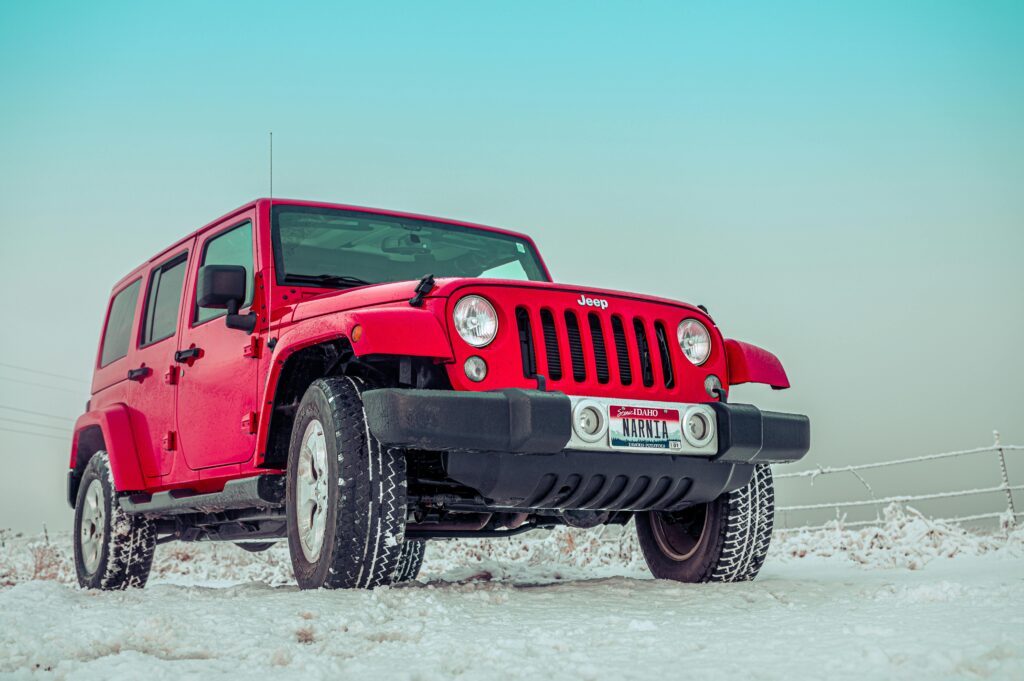HIGHLIGHTS:
- A car owner is suing Jeep manufacturer over allegations that it knowingly sold vehicles prone to underhood fires
- According to the plaintiff, certain vehicles under different year models face ongoing risks due to defects in the power steering pump electrical connector or high-voltage battery.
- Jeep’s manufacturer recalled nearly 200,000 vehicles. To prevent any potential threats, it advised car owners to park outside and away from their vehicles until call repairs were completed.

A red Jeep SUV on a snowy field. Photo by Brett Sayles on Pexels
A car owner is suing automobile manufacturer FCA US LLC, owner of the brand Jeep, over allegations that it was aware it sold vehicles that are prone to underhood fires.
In a class action lawsuit filed in the federal court of Michigan on January 7, plaintiff Stan Paris claimed that the company violated state and federal consumer laws.
Paris was referring to certain Jeep vehicles namely Wrangler, with year models between 2020 to 2024; Gladiator, from 2021 to 2023; and Grand Cherokee from 2022 to 2024.
Paris, a resident of Pennsylvania, said he purchased a 2023 Jeep Wrangler Unlimited 4XE in July 2024.
Power Steering Pump Defect
Based on the complaint, Paris and other vehicle owners said the year models face ongoing risks due to defects in the power steering pump electrical connector or high-voltage battery. It added that the flaws can result in spontaneous underhood fires even when the vehicles are parked or turned off.
Paris said his claims are backed by federal watchdogs.
In September 2024, the National Highway Traffic Safety Administration (NHTSA) kicked off an investigation into more than 781,000 affected Jeep models following multiple complaints, including at least one incident that caused injuries.
Paris said the NHTSA’s recall notices and consumer alerts underscore the severity of the issue, saying that he and other Jeep owners were left with vehicles that he claimed “could catch fire at any second.”
FCA Investigation Failed to Resolve Risks
In late September, FCA recalled at least 194,000 plug-in hybrid electric vehicles to address the risks after 13 fires were reported. To prevent any potential threats, it advised car owners to park outside and away from their vehicles until call repairs were completed.
The company admitted that the high-voltage battery “may fail internally and lead to a vehicle fire while parked or driving.”
Despite FCA’s proposed fixes, Paris alleged that the company had failed to resolve the fire risks adequately. The lawsuit claimed that FCA “knew or should have known” about the dangers well before the NHTSA investigation, pointing to consumer complaints and a prior recall issued in 2023 for similar fire hazards.
Paris stated that the defect had disrupted his life, forcing him to park his Jeep in an outdoor airport lot at $26 per day to avoid potential harm to people and property.
As a result, Paris sought to represent anyone else who had purchased or leased one of the affected vehicles. He sued FCA for breaching implied warranties and violating the Magnuson-Moss Warranty Act, as well as state laws. He sought certifications for the class action, damages, fees, costs, and a jury trial.
Late last year, Stellantis recalled nearly 80,000 Jeep Grand Cherokee and other Jeep vehicles because their rearview camera images might not display, creating a crash risk.

